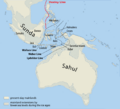Homo luzonensis facts for kids
Homo luzonensis is the name of an ancient human relative. Scientists found its fossil bones on Luzon, a big island in the Philippines.
These bones and teeth are about 67,000 years old! They were found in a place called Callao Cave. Researchers believe these remains belong to a new type of human ancestor that was not known before. However, some experts are still studying them to be absolutely sure.
Discovering an Ancient Relative
An archaeologist named Armand Mijares first started digging in Callao Cave in 2003. He stopped after digging a little over one meter deep.
In 2004, another ancient human relative called Homo floresiensis was found in Indonesia. This discovery made Mijares want to go back to Callao Cave. So, in 2007, he returned. About one and a half meters deeper than where he had stopped before, his team found some fossil bones. One of these bones was a human metatarsal, which is a foot bone.
At first, Mijares thought this foot bone might belong to a small Homo sapiens (modern human). But his team kept digging in 2011 and 2015. They found more bones and teeth from at least three different individuals. These new remains looked very different from Homo sapiens bones. Because of these differences, scientists working on the fossils decided it was a brand new species.
Images for kids
-
Interior of Callao Cave, Luzon, the Philippines
-
Comparison of teeth (above) and foot phalanges (below) of A. afarensis (left), H. luzonensis (center), and modern humans (right)
-
The ancestors of H. luzonensis crossed the Huxley Line into the Philippines.
See also
 In Spanish: Hombre del Callao para niños
In Spanish: Hombre del Callao para niños
 | Georgia Louise Harris Brown |
 | Julian Abele |
 | Norma Merrick Sklarek |
 | William Sidney Pittman |




